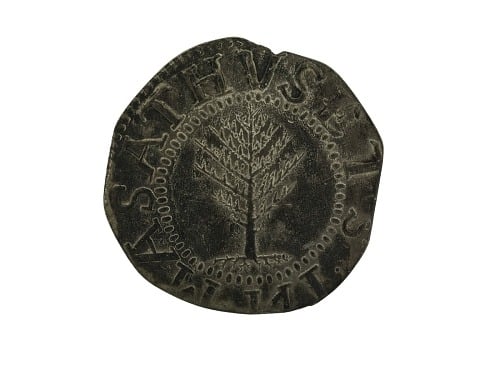This month in history: Mass. minted the first colonial coins
This pine shilling was likely created between 1667 and 1674, according to the National Museum of American History. Earlier versions of the coins had willow or oak trees. Photo courtesy of the National Numismatic Collection, National Museum of American History, Smithsonian Institution
What: Passing of the Massachusetts Bay Mint Act
When: 26-27 May 1652
From where: Boston
- Early Massachusetts colonists had some forms of coinage, including the wampum, a shell used in trade with Native American tribes, and foreign coinage. British authorities wanted colonists to barter for goods or services, but Massachusetts Bay residents preferred the independence and purchasing power that coins brought, according to the Federal Reserve Bank of Boston’s “History of Colonial Money.”
- Although the creation of currency in the colonies was not legal, both houses of the Massachusetts Bay General Court passed legislation establishing a mint and appointed John Hull as mint master. The mint remained active until British authorities ordered its closure in 1682.
- The first silver coins were easy to counterfeit, leading the court to call for a redesign that featured a tree on one side. The coins, later known as Pine Tree Shillings, were dated to 1652 so Massachusetts could claim to England that no coins had been minted since that year, according to the Philadelphia Federal Reserve.
In celebration of its 150th anniversary, Banker & Tradesman highlights significant moments in the history of Massachusetts real estate and banking. To suggest a topic, send an email [email protected].
“In view of many counterfeit coins being brought into the country and great losses in this respect (and this caused trade to be disrupted), the court ordered the establishment of a mint. … And they chose me for this job; and I chose my friend Robert Sanderson as my partner, who the court approved.”
— From the ‘Diaries of John Hull’ in the Manuscript Collection of the American Antiquarian Society


Comments are closed.